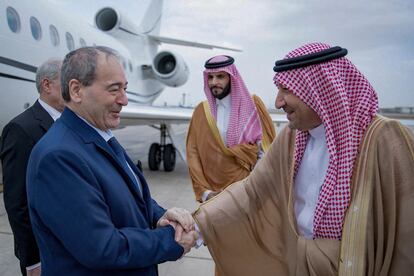Syria and Saudi Arabia move toward restoring embassies and flights
The countries’ joint statement on Thursday followed a visit by Syria’s top diplomat to the kingdom, the first since Saudi Arabia cut diplomatic relations with Syria in 2012

Syria and Saudi Arabia said Thursday they were moving toward reopening embassies and resuming flights between the two countries for the first time in more than a decade. The joint statement followed a visit by Syria’s top diplomat to the kingdom, the first since Saudi Arabia cut off diplomatic relations with Syria in 2012.
Syria was widely shunned by Arab governments over Syrian President Bashar Assad’s brutal crackdown on protesters in a 2011 uprising that descended into civil war. The breakdown in relations culminated with Syria being ousted from the Arab League.
However, in recent years, as Assad consolidated control over most of the country, Syria’s neighbors have begun to take steps toward rapprochement. The overtures picked up pace since the massive Feb. 6 earthquake in Turkey and Syria, and the Chinese-brokered reestablishment of ties between Saudi Arabia and Iran, which had backed opposing sides in the Syrian conflict.
Syrian Foreign Minister Faisal Mikdad, at the invitation of Saudi Foreign Minister Faisal bin Farhan Al Saud, arrived in Saudi Arabia on Wednesday for talks about bilateral relations, state media in the two countries reported. Saudi state media said Mikdad was received by the kingdom’s Deputy Foreign Minister Waleed Al-Khuraiji.
The meeting focused on the steps needed to reach a “comprehensive political settlement of the Syrian crisis that would ... achieve national reconciliation, and contribute to the return of Syria to its Arab fold,” the joint statement said.
Saudi Arabia is hosting the next Arab League summit in May, when Syria’s membership is widely expected to be on the table. Some members, mainly Qatar, have opposed Damascus’ return to the organization.
Qatar’s prime minister, Sheikh Mohammed bin Abdulrahman Al Thani, reiterated his country’s longstanding position in an interview with state TV late Thursday.
“There were reasons for suspending Syria’s membership in the Arab League and for participating in boycotts of the Syrian regime at that time, and those reasons still exist as far as we are concerned,” he said. “Our decision, as an individual state, has been to not take any steps (toward normalization) without political progress or a political solution to the Syrian crisis.”
But Anna Jacobs, a senior analyst with the International Crisis Group, said she believes “prospects are high that Syria will be readmitted to the Arab League soon,” noting that even Qatar has softened its rhetoric.
“Even if several countries have expressed their opposition to normalization with Assad, it’s not likely that they would go against Riyadh and block Syria’s re-entry,” she said.
The Syrian and Saudi officials also discussed “enhancing security” and ‘’cooperation in combating drug smuggling and trafficking,” according to the statement. Syria is a primary producer of the amphetamine-based drug Captagon, which is largely smuggled into Gulf Arab markets for sale.
Syria may be hoping the rapprochement with a regional heavyweight will help end its political isolation, improve its flagging economy and potentially bring in reconstruction dollars. Meanwhile, incentives for Saudi Arabia to make a deal are less clear.
Kristian Coates Ulrichsen, a research fellow at Rice University’s Baker Institute, said Saudi Arabia — and specifically Crown Prince Mohammed bin Salman — may be looking for a way to rehabilitate the kingdom’s image. That image was tarnished by the kingdom’s involvement in the war in Yemen and by the 2018 slaying of Washington Post columnist Jamal Khashoggi at the Saudi Consulate in Istanbul, believed by the United States and others to have been at the prince’s orders.
Brokering an Arab consensus on Syria, would feed into Prince Mohammed’s “desire to portray himself as a regional statesman” and “underline the Saudi ability to lead the region,” Ulrichsen said.
Jacobs said the kingdom’s rapprochement with Syria may be part of its strategy on Iran, which is “two-pronged and focused on both containment and diplomacy,” as opposed to the Trump administration’s maximum pressure approach.
As for Syria, Ulrichsen pointed out that U.S. sanctions on Damascus would still stand as an obstacle to any major investments in the Arab country, even with Syria normalizing ties with Saudi Arabia and its readmission to the Arab League.
Mikdad’s visit to Saudi Arabia came after Syria announced on Wednesday that it will reopen its embassy in Tunisia, which cut off relations in 2012. Tunisian President Kais Saied said earlier this month that he had directed the foreign ministry to appoint a new ambassador to Syria.
His move was reciprocated by the Syrian government, according to Syrian state news agency SANA.
Sign up for our weekly newsletter to get more English-language news coverage from EL PAÍS USA Edition
Tu suscripción se está usando en otro dispositivo
¿Quieres añadir otro usuario a tu suscripción?
Si continúas leyendo en este dispositivo, no se podrá leer en el otro.
FlechaTu suscripción se está usando en otro dispositivo y solo puedes acceder a EL PAÍS desde un dispositivo a la vez.
Si quieres compartir tu cuenta, cambia tu suscripción a la modalidad Premium, así podrás añadir otro usuario. Cada uno accederá con su propia cuenta de email, lo que os permitirá personalizar vuestra experiencia en EL PAÍS.
¿Tienes una suscripción de empresa? Accede aquí para contratar más cuentas.
En el caso de no saber quién está usando tu cuenta, te recomendamos cambiar tu contraseña aquí.
Si decides continuar compartiendo tu cuenta, este mensaje se mostrará en tu dispositivo y en el de la otra persona que está usando tu cuenta de forma indefinida, afectando a tu experiencia de lectura. Puedes consultar aquí los términos y condiciones de la suscripción digital.








































